-
 Bitcoin
Bitcoin $82,683.4967
0.78% -
 Ethereum
Ethereum $1,829.2967
1.42% -
 Tether USDt
Tether USDt $0.9999
-0.02% -
 XRP
XRP $2.0967
-0.75% -
 BNB
BNB $606.5472
1.02% -
 Solana
Solana $125.0276
0.61% -
 USDC
USDC $1.0000
-0.01% -
 Dogecoin
Dogecoin $0.1676
0.95% -
 Cardano
Cardano $0.6650
1.26% -
 TRON
TRON $0.2382
2.59% -
 Toncoin
Toncoin $4.1025
5.56% -
 Chainlink
Chainlink $13.5754
1.83% -
 UNUS SED LEO
UNUS SED LEO $9.1395
0.29% -
 Stellar
Stellar $0.2651
-0.15% -
 Avalanche
Avalanche $18.8485
0.75% -
 Shiba Inu
Shiba Inu $0.0...01250
0.76% -
 Sui
Sui $2.2808
-1.77% -
 Hedera
Hedera $0.1640
-1.56% -
 Polkadot
Polkadot $4.0427
0.61% -
 Litecoin
Litecoin $83.3594
-2.70% -
 MANTRA
MANTRA $6.2703
0.56% -
 Bitcoin Cash
Bitcoin Cash $304.1339
1.64% -
 Bitget Token
Bitget Token $4.5229
-1.25% -
 Dai
Dai $0.9999
-0.02% -
 Ethena USDe
Ethena USDe $0.9998
-0.03% -
 Pi
Pi $0.7229
-6.19% -
 Hyperliquid
Hyperliquid $13.0555
5.79% -
 Monero
Monero $215.2463
-1.28% -
 Uniswap
Uniswap $6.0107
2.74% -
 Aptos
Aptos $5.2988
0.53%
How to prevent the address from being tampered when transferring money in Ethereum wallet?
Prevent irreversible Ethereum fund loss by meticulously verifying recipient addresses, using copy-paste, checking checksums, and employing reputable wallets & security practices like hardware wallets.
Mar 25, 2025 at 07:00 am
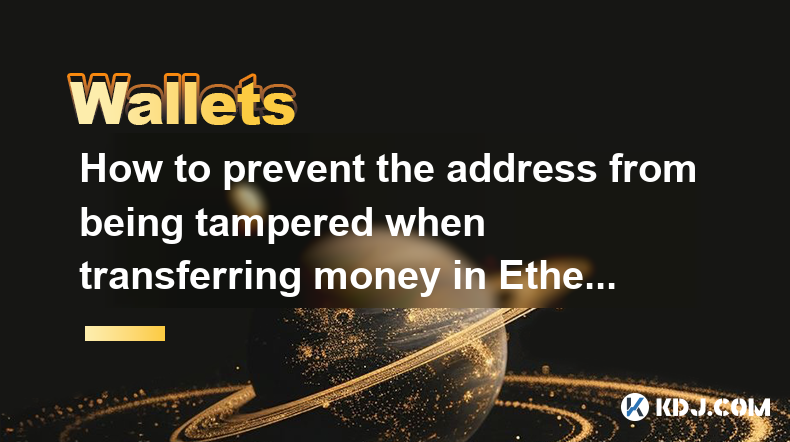
How to Prevent the Address from Being Tampered When Transferring Money in Ethereum Wallet?
Transferring funds in the Ethereum ecosystem requires meticulous attention to detail to ensure the security of your assets. A seemingly small error can lead to irreversible loss of funds. This article explores various methods to safeguard against address tampering during Ethereum transactions. Remember, vigilance is key in the world of cryptocurrency.
Understanding the Risk of Address Tampering
The primary risk lies in accidentally sending your ETH or ERC-20 tokens to an incorrect address. This could be due to manual typos, malicious actors manipulating links or QR codes, or vulnerabilities in third-party software. Once a transaction is confirmed on the Ethereum blockchain, it's irreversible. Therefore, prevention is paramount.
Verifying the Recipient Address: The Foundation of Security
- Double-check, then triple-check: Carefully compare the recipient's Ethereum address displayed in your wallet with the address you intend to send funds to. Look for any discrepancies, even a single character difference.
- Use copy-paste cautiously: Avoid manually typing the address. Instead, copy it directly from a trusted source and paste it into your wallet's send field.
- Verify checksums: Ethereum addresses incorporate checksums to detect errors. Your wallet should highlight any discrepancies in the checksum. Ensure the address you're using matches the checksum.
- Use a reputable wallet: Choose wallets with a strong reputation for security and user-friendliness, reducing the risk of vulnerabilities.
Advanced Techniques for Enhanced Security
- Paper wallets: For long-term storage, generating a paper wallet offers a high degree of security. The private key is stored offline, minimizing the risk of online attacks.
- Hardware wallets: These devices provide a secure offline environment for managing your private keys, protecting them from malware and phishing attacks. Transactions are signed on the device itself.
- Multi-signature wallets: These require multiple signatures to authorize transactions, adding an extra layer of security against unauthorized access.
Minimizing Risks with Third-Party Services
When using third-party services to interact with your Ethereum wallet, exercise caution.
- Scrutinize URLs: Be wary of phishing websites masquerading as legitimate services. Always verify the URL and look for SSL certificates.
- Check reviews and reputation: Research the platform before interacting with it. Look for reviews and check its reputation to ensure it's trustworthy.
- Avoid suspicious links: Do not click on links from untrusted sources. Malicious links can redirect you to phishing websites designed to steal your credentials.
Understanding Transaction Details Before Confirmation
Before confirming any transaction, meticulously review the details.
- Recipient Address: Verify the recipient address one last time.
- Amount: Double-check the amount of ETH or tokens you're sending.
- Gas Fee: Ensure you understand and accept the gas fee, which compensates miners for processing the transaction.
- Transaction Data (for ERC-20 tokens): Check the data field for accuracy, especially when interacting with smart contracts.
Protecting Your Wallet from Malware and Phishing
- Install reputable antivirus software: Protect your computer from malware that could compromise your wallet security.
- Beware of phishing attempts: Be cautious of unsolicited emails, messages, or phone calls requesting your private keys or wallet information.
- Use strong passwords: Create complex and unique passwords for your wallet and all online accounts.
- Regularly update your software: Keep your operating system, wallet software, and antivirus software updated to patch security vulnerabilities.
Common Questions and Answers
Q: What happens if I send ETH to the wrong address?
A: Unfortunately, transactions on the Ethereum blockchain are irreversible. Once confirmed, the funds are lost. There is no way to recover them.
Q: Can I recover funds sent to the wrong address?
A: No, there is no mechanism to reverse an Ethereum transaction. The only potential recourse might be if the recipient is cooperative and returns the funds, but this is not guaranteed.
Q: Are there any services that can help recover funds sent to the wrong address?
A: No legitimate service can recover funds sent to the wrong Ethereum address. Be wary of scams promising such services.
Q: How can I be absolutely certain I'm sending to the correct address?
A: There's no absolute certainty, but meticulous double-checking, using copy-paste instead of manual typing, verifying checksums, and using reputable wallets significantly reduces the risk.
Q: What is the best way to store my Ethereum?
A: The best method depends on your needs and risk tolerance. Hardware wallets provide the highest level of security, while software wallets offer convenience. Paper wallets are suitable for long-term offline storage.
Q: What should I do if I suspect my wallet has been compromised?
A: Immediately change your passwords, contact your wallet provider if applicable, and monitor your account for unauthorized activity. You may need to report the incident to law enforcement.
Q: Are QR codes a safe way to transfer Ethereum?
A: QR codes can be a convenient method, but only if you are absolutely certain the QR code is generated from a trusted source. Malicious actors can create fake QR codes that redirect to fraudulent websites or contain incorrect addresses. Always manually verify the address displayed in the QR code before scanning.
Disclaimer:info@kdj.com
The information provided is not trading advice. kdj.com does not assume any responsibility for any investments made based on the information provided in this article. Cryptocurrencies are highly volatile and it is highly recommended that you invest with caution after thorough research!
If you believe that the content used on this website infringes your copyright, please contact us immediately (info@kdj.com) and we will delete it promptly.
- Bitcoin (BTC) price dips below ascending channel pattern as whales mirror a 2020 bull run signal
- 2025-04-01 07:50:12
- Mutuum Finance (MUTM) Has Been Relatively Quiet, But It's Building Fast
- 2025-04-01 07:50:12
- Cardano (ADA) Gains 4% This Week, Trading at $0.74 as Bullish Pressure Builds
- 2025-04-01 07:45:12
- Elon Musk Quashes Rumors of U.S. Government Using Dogecoin (DOGE) in Any Kind of Operations
- 2025-04-01 07:45:12
- Ethereum (ETH) and Solana (SOL) Prices Could Plunge as FTX Begins Creditor Repayments on May 30
- 2025-04-01 07:40:12
- Acting SEC Chair Rejects Enforcement, First US Bank-Issued Stablecoin, Bitcoin's Four-Year Cycle at Crossroads
- 2025-04-01 07:40:12
Related knowledge
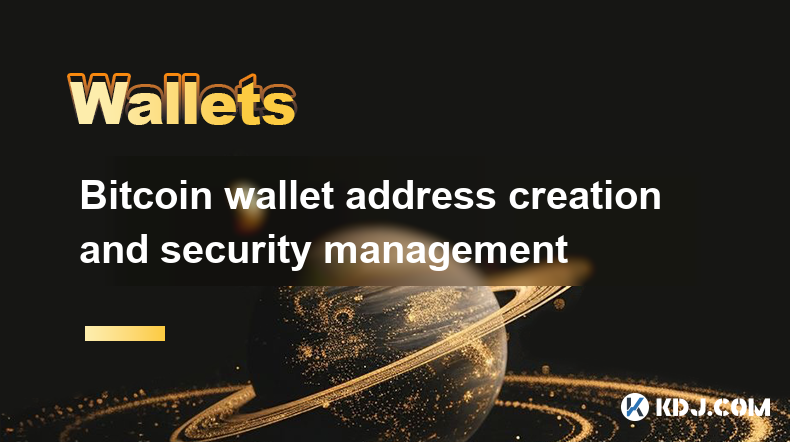
Bitcoin wallet address creation and security management
Mar 31,2025 at 10:56pm
Understanding Bitcoin Wallet AddressesA Bitcoin wallet doesn't store Bitcoin directly. Instead, it stores private keys which are long strings of characters. These keys grant access to your Bitcoin. Your public key, derived from the private key, is used to generate your Bitcoin wallet address, a unique identifier similar to a bank account number. This a...

How to easily generate a Bitcoin payment address
Mar 29,2025 at 10:49am
Generating a Bitcoin payment address might seem daunting, but it's actually quite straightforward. This process is crucial for receiving Bitcoin, as each transaction requires a unique address. Understanding how this works is fundamental to using Bitcoin effectively. This guide will walk you through the simple steps, regardless of your technical experti...
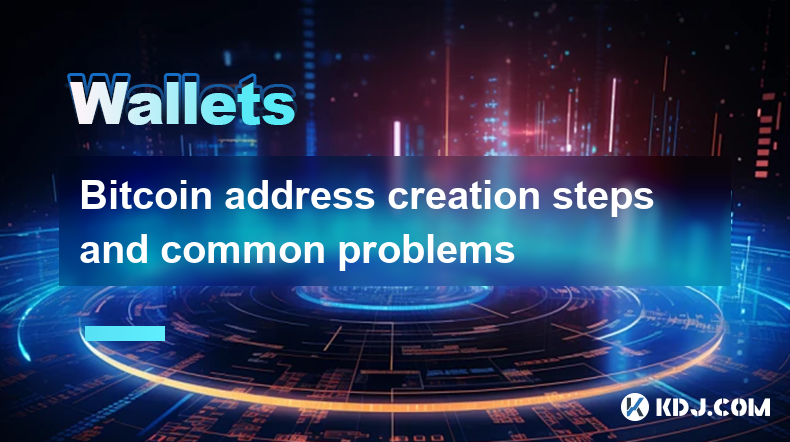
Bitcoin address creation steps and common problems
Mar 30,2025 at 06:07am
Understanding Bitcoin AddressesA Bitcoin address is a unique identifier, similar to a bank account number, used to receive Bitcoin. It's a string of alphanumeric characters generated from a public key, derived from your private key. Understanding the distinction between public and private keys is crucial for Bitcoin security. Your private key should be...
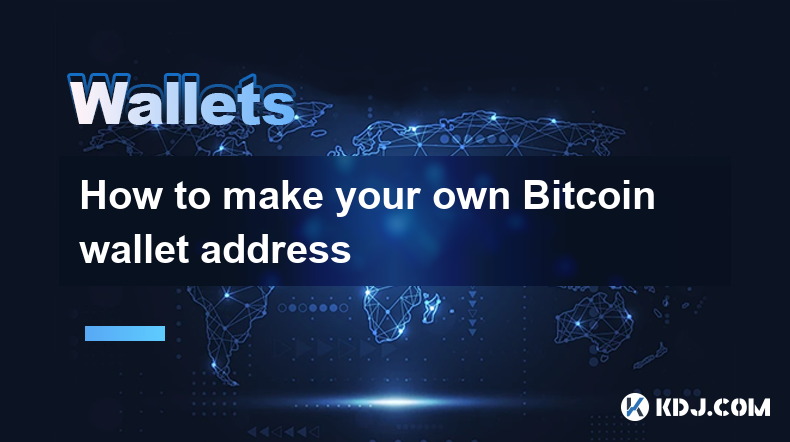
How to make your own Bitcoin wallet address
Mar 29,2025 at 08:42pm
Creating your own Bitcoin wallet address is crucial for securing and managing your Bitcoin holdings. It allows you to independently receive and send Bitcoin without relying on third-party services. This process involves understanding the different types of wallets and choosing the one that best suits your needs and technical expertise. Incorrectly gene...
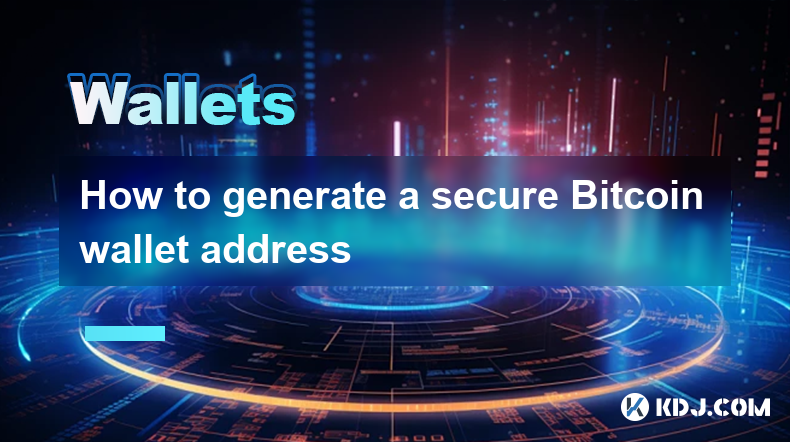
How to generate a secure Bitcoin wallet address
Apr 01,2025 at 03:14am
Understanding Bitcoin Wallet AddressesA Bitcoin wallet doesn't actually store your Bitcoin. Instead, it stores your private keys, which are long strings of characters that grant you access to your Bitcoin. Your public key, derived from your private key, is used to generate your Bitcoin address, a unique identifier similar to a bank account number. This...
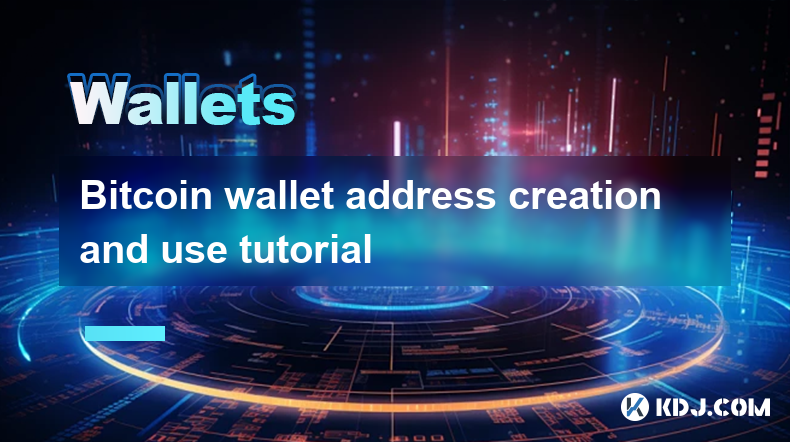
Bitcoin wallet address creation and use tutorial
Mar 29,2025 at 10:14pm
Understanding Bitcoin Wallet AddressesA Bitcoin wallet doesn't store Bitcoin in the way a traditional bank account does. Instead, it stores private keys, which are cryptographic secrets allowing you to access and spend your Bitcoin. Your Bitcoin address, on the other hand, is a public identifier, like an email address, that others can use to send you B...

Bitcoin wallet address creation and security management
Mar 31,2025 at 10:56pm
Understanding Bitcoin Wallet AddressesA Bitcoin wallet doesn't store Bitcoin directly. Instead, it stores private keys which are long strings of characters. These keys grant access to your Bitcoin. Your public key, derived from the private key, is used to generate your Bitcoin wallet address, a unique identifier similar to a bank account number. This a...

How to easily generate a Bitcoin payment address
Mar 29,2025 at 10:49am
Generating a Bitcoin payment address might seem daunting, but it's actually quite straightforward. This process is crucial for receiving Bitcoin, as each transaction requires a unique address. Understanding how this works is fundamental to using Bitcoin effectively. This guide will walk you through the simple steps, regardless of your technical experti...

Bitcoin address creation steps and common problems
Mar 30,2025 at 06:07am
Understanding Bitcoin AddressesA Bitcoin address is a unique identifier, similar to a bank account number, used to receive Bitcoin. It's a string of alphanumeric characters generated from a public key, derived from your private key. Understanding the distinction between public and private keys is crucial for Bitcoin security. Your private key should be...

How to make your own Bitcoin wallet address
Mar 29,2025 at 08:42pm
Creating your own Bitcoin wallet address is crucial for securing and managing your Bitcoin holdings. It allows you to independently receive and send Bitcoin without relying on third-party services. This process involves understanding the different types of wallets and choosing the one that best suits your needs and technical expertise. Incorrectly gene...

How to generate a secure Bitcoin wallet address
Apr 01,2025 at 03:14am
Understanding Bitcoin Wallet AddressesA Bitcoin wallet doesn't actually store your Bitcoin. Instead, it stores your private keys, which are long strings of characters that grant you access to your Bitcoin. Your public key, derived from your private key, is used to generate your Bitcoin address, a unique identifier similar to a bank account number. This...

Bitcoin wallet address creation and use tutorial
Mar 29,2025 at 10:14pm
Understanding Bitcoin Wallet AddressesA Bitcoin wallet doesn't store Bitcoin in the way a traditional bank account does. Instead, it stores private keys, which are cryptographic secrets allowing you to access and spend your Bitcoin. Your Bitcoin address, on the other hand, is a public identifier, like an email address, that others can use to send you B...
See all articles























































































